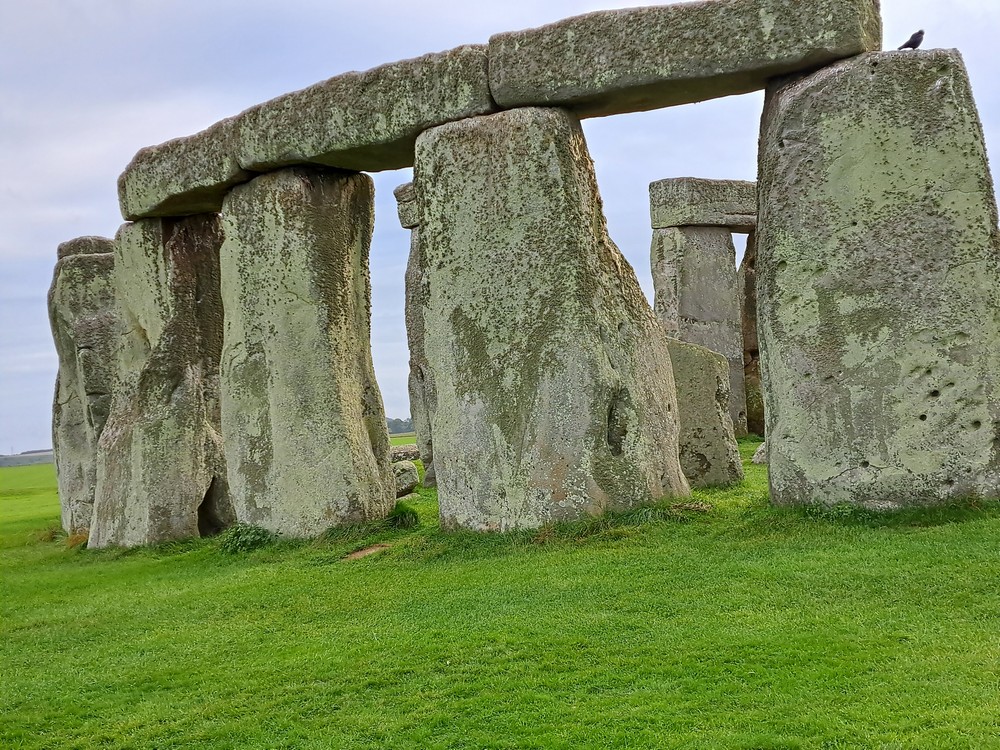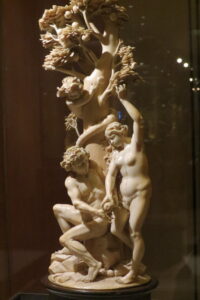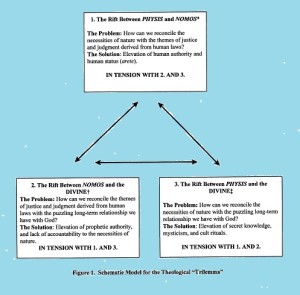RS34: Walking on Water
Jen has reminded me I haven’t written a solo post here, so I’m going to do that today. I’m going to talk about what it feels like to walk on water.
I don’t mean that I or any human being has ever been able to literally walk on water. When my great-nephew wrote about “walking on water” in the Gospel of Mark, he didn’t mean it literally. He meant it metaphorically. He was trying to describe what it feels like when a person has entered into the Kingdom state of fullness of heart.
He chose the image of water carefully. In Second Temple Judaism, water was a powerful and frequent symbol in Jewish texts. Often it meant blessings from God. In an arid region, rainfall is a blessing, and most of ancient Judea was arid. But there was a parallel understanding of water, too, as the primal force of chaos, the place where uncontrollable monsters lived. Where female monsters lived.
The Book of Genesis starts out with the assumption that water has to be pushed back by God and held in place before the Garden of Eden can be planted. The sea is seen as a dangerous place. An unpredictable place. A deep place which is formless and dark, with no knowledge in it. God fixes this problem by first bringing light (knowledge of order and symmetry) onto the scene. He calls the light Day and the darkness Night, but he hasn’t created the Sun or the Moon yet, so the light he brings to Planet Earth isn’t sunlight. It’s the light of knowledge.
The men who wrote the Book of Genesis emphasize again and again that you should want to have order in your life. Order is good. Chaos is bad. There’s knowledge, and God saw that it was good. There’s careful separation of all major “elements” into their proper places, and God saw that it was good. There’s careful naming of all creations, large and small, and God saw that it was good. The earth itself (adam in Hebrew) is separated into two aspects — male and female — and given the breath of life. The resulting creations, man and woman, who are made in the image of God, are God’s representatives on Earth and through them God can impose the law of hierarchy upon all other kingdoms in creation (kingdoms in a biological sense, that is). And God saw that it was good. By the seventh “day,” God has put a big, fat leash on all that watery chaos stuff and firmly imposed the Law of Cause and Effect upon Planet Earth, and it’s so darned good that God calls for a day of rest to honour his accomplishments.
And what is Elohim’s greatest accomplishment? The greatest accomplishment of Elohim (“the gods” in Hebrew) is to whip that dark, watery, feminine principle into shape and force it to obey the male principles of order, knowledge, law, and hierarchy. When Elohim creates humankind — adam — he creates adam entirely out of strong, orderly, procreative, male earth. No water in sight. Elohim adds the breath of life (by inference from Gen. 1:30) to his new creations, but he’s very careful not to include any of that chaotic water stuff in his perfect new creations. Water’s okay when it’s in its proper place, but let it loose, and there’s no describing the destruction that will occur.
Oh wait! There is a description! Let me see now . . . of yes, that would be the Great Flood story. The Great Flood story reminds you (just in case you need reminding) what happens when bits and pieces of the Divine Order fall out of their proper places and start to misbehave (Gen. 6:1-7) and why God’s creation of order and hierarchy is a good thing! A good thing you really, really want!
Still, even the bad behaviour of the Nephilim was nothing compared to the fall of the Feminine Principle. When the Feminine Principle fell out of her proper place in the heavens and coalesced into the dark, formless, watery depths that existed before God came to rescue her with his light of knowledge an’ all . . . well, that was a real mess. A mess that still needs fixing. Occasionally, if things get really bad on Earth, God unleashes her and lets the monsters out, which is exactly why you need to put a Molten Sea in front of your big temple (1 Kings 7:23-26). You need to remind your people that God has given you power over the forces of chaos by proxy.
This power by proxy comes in the form of ritual bathing in water that has been tamed. Fresh water — including rainfall — is water that has been properly tamed by God. Restored to its true state of purity. Immersion in purified water allows you to share in God’s purification process. (It also happens to make you cleaner, and therefore healthier and happier, but this is a separate question.)
Mark, a trained scholar, had all these traditions about water in mind when he chose to show me “walking on water” in the middle of his Parable of the Idol Bread (Mark 6:47-51). He’s turned the traditional meaning of water on its head. It’s a new relationship with water. Nobody commands the waters of Lake Tiberias to part so Jesus can walk across on dry land. Nobody immerses themselves in the waters in baptism. Nobody puts the waters in big jars or little jars or cauldrons or ritual baths. The lake is the lake, the way it’s always been the lake. And Jesus is Jesus, the way he’s always been Jesus. And the lake and Jesus seem to be getting along! No fighting with the lake, no thrashing with monsters in the lake, no prayer rituals to calm the lake. Jesus starts walking towards his companions (who are struggling with questions of understanding and true faith) and the lake suddenly calms down as if maybe the waters (the Feminine Principle) and Jesus are working together and aren’t in conflict with each other. As if maybe the waters are comfortable supporting Jesus because he has already “taken heart and stopped being afraid.” As if maybe the waters are not and never have been the problem.
The problem is written down in black and white as plain as you can get in Chapter 7 of Mark. The problem is not what you touch on the outside of your body. The problem is not the water itself or what you do with the water. The problem is what you choose to do on the inside of your body. The problem is what you choose to do with your own free will.
The journey to know your own free will, as I said last time in conversation with Jen, is very much a journey that resembles the stages of grief. All people must wrestle with what it means to have free will. They must question it, be confused by it, be angry at it, reject it, and finally come to terms with it. As the character Job once did. As I did as Jesus son of Joseph two millennia ago.
There’s a reason for this, a reason that has nothing to do with sin or salvation or sacraments or separation from God. The reason for this painful journey is that God trusts you.
Human beings often wonder why they’re here and why it has to hurt so much. Many reasons have been offered over the centuries by different religious leaders. In the tradition of Occam’s razor, I offer this: you are here to learn how God the Mother and God the Father discovered together how to walk on water. You’re here so you can experience firsthand what it means to use your free will in every permutation possible in the service of Divine Love.
Put that way, it sounds simple, doesn’t it? But it’s not. You know that and I know that. It’s damned hard to work your way through the stages of knowing what free will means. Not what you, as a human being, think it means, but what God the Mother and God the Father think it means.
To live from a place of pure free will is, as you may imagine, the very opposite of living in a world of pure cause and effect. But once, long ago, long before the event called the Big Bang took place, the universe was not as we know it today, and the laws of cause and effect held much more sway than they do today. This is hard — beyond hard — for most angels to understand, so some of us decide to incarnate here to see what this kind of existence must have felt like. Our Divine Parents let us do this because they trust us.
When souls decide to incarnate here as human beings, they know it’s going to be hard, but when they get here they find out it’s even harder than they could have imagined. They do it anyway, though, because they’re experiencing something important, something that’s part of their history, their past. They want to understand their relationships with everyone at a much deeper level, and this crazy journey called “life as a human being” helps them do it.
Not every soul chooses to do this. But the ones who do, do so voluntarily. These are the souls who are primarily kinesthetic learners at a deep soul level. They learn best by experiencing something firsthand, by walking a mile in somebody else’s shoes so they really “get” what it feels like.
If you’re reading this, it means you wanted to come to Planet Earth for a while so you can walk in your Divine Parents’ shoes and see for yourself what it felt like for them to work together to overturn the rule of “cause and effect” and replace it with something infinitely more powerful and mysterious: Divine Love (a.k.a. quantum physics).
The human brain (unlike other mammalian brains) has an annoying habit of trying to shed its own emotions and slip into the unloving habits of cause and effect. (As your cats and dogs like to remind you.) So the human brain is ideally suited to this particular journey of discovery. It has both a great potential for learning and a great potential for unlearning. So to state your brain gives you the option to explore every possible nook and cranny of free will would be an understatement.
I know you can think of a thousand examples of people who didn’t use their free will in loving and trusting ways. But what about the people who have come to terms with their own free will? Who are they and what do their lives look like? More important, are these people “special,” or can anyone on Planet Earth find this experience of redemption?
We’ve often used the term “redemption” on this site in contradistinction to religious salvation, and I’d like to talk about this a bit more. Any human being — regardless of gender, sexual orientation, age, culture, time, place, or religion — who has worked through the grief stages of free will is a person who has experienced redemption in the way that I experienced it. Redemption is the emotional insight that fills up a person’s entire heart and mind with the knowledge that it’s okay to never fear the Truth.
There’s Truth in the universe and there’s Divine Love. They’re not the same thing. Truth exists in the absence of consciousness. Divine Love is the choice of consciousness to never hide from the Truth, to always be transparent to the Truth, to fully embrace whatever is true about another being without losing the truth of oneself. What does this mean? It means that Divine Love always respects the right of another person to be another person and not a mere extension of one vast cloud of self.
A human being who understands that free will holds the key to Divine Love, forgiveness, passionate creativity, and committed relationships (devotion) is a human being who has found redemption.
Such a person can be found anywhere. And, indeed, such individuals are found in all cultures. They are the people who simply won’t back down from the idea that all beings are worthy of respect, fair treatment, compassion, kindness, and encouragement. They are the people who believe in social justice and due process, in democracies rather than republics or empires, in transparency in government and accountability for intentional harms. They are the people who treat women with as much respect as men, who treat the planet with as much respect as they treat other human beings. They are the people who treat their children as souls in need of education, guidance, mentorship, and respect instead of as property to be bartered for status or personal gratification. They are the people who don’t whine and complain and blame God for all the travails they’ve chosen themselves. Most of all, they’re the people who have the courage to see their neighbours as worthy human beings, not as objects of hatred, contempt, and violence.
When you really “get it” — when you understand that your ability to choose your path does not make you separate from the rest of Creation but is in the fact the very glue that holds God’s family together as a loving, trusting group — the world no longer feels to you like a place where good is fighting evil or light is fighting dark or order is fighting chaos. It doesn’t feel like a fight any longer, but neither does it feel like mere acceptance of the way things are (which is often just resignation in disguise). It’s not obedience. It’s not piety. It’s not subjugation. It’s not anomie. It’s not cynicism. It’s not apathy. It’s not depression. It’s not escapism. It’s just . . . honesty. The heart’s honesty. The heart’s willingness to see things as they really are and, despite that, to dig deeper, ever deeper — or maybe higher, ever higher — into empathy for another person’s Truth.
There is no adequate word for this emotion in English. “Trust” would come closest.
When you have this sense of trust, it feels as if you’re holding God’s hand and God is guiding you through the storms and worries of daily life.
It feels as if you’re walking on water.
Blessings to all,
Love Jesus
September 19, 2012
























